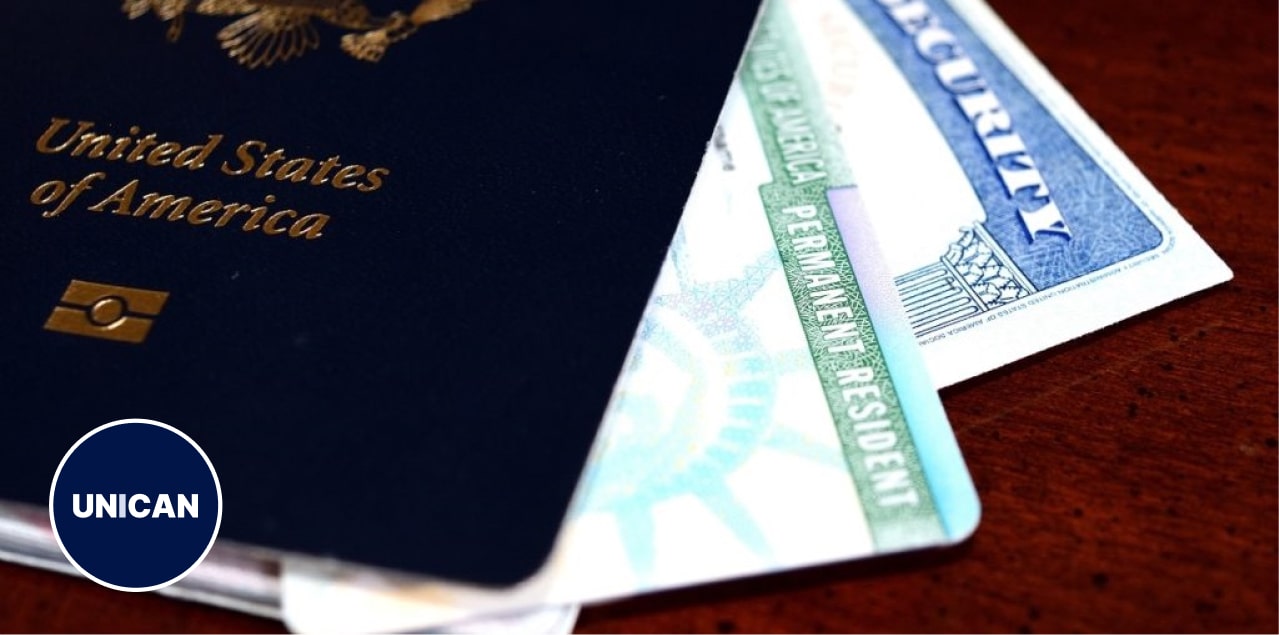USA EB1 Green card
Am I Eligible for a USA EB1 Green Card?
To qualify for an EB-1A Green Card, you must be able to prove that you have extraordinary ability in one of the following fields: Science, Art, Education, Business, or Athletics. Additionally, you must possess a level of expertise in your field that indicates that you are one of the small percentages of people who have risen to the very top of your field, and your professional achievements must have received national and international recognition.
How Does the Immigration Service Determine if You Have Extraordinary Ability in Your Field?
You can demonstrate your extraordinary ability by showing that you have received a major, internationally recognized award (such as a Nobel Prize, Pulitzer Prize, Oscar, or Olympic Medal), or, as is the case for most people, by providing a sufficient amount of compelling documentation meeting at least 3 of the following 10 criteria:
-
Awards: Receipt of lesser nationally or internationally recognized prizes or awards for excellence in your field.
These awards serve as evidence of the individual’s exceptional ability, achievements, and recognition by experts or organizations in their industry.
The immigration service looks for awards that are highly regarded and prestigious within the applicant’s field.
These awards may vary depending on the industry, but they generally include internationally recognized honors, prizes, or accolades.
Examples could be Nobel Prizes, Pulitzer Prizes, Academy Awards, Grammy Awards, or other similar distinguished honors.
The awards should reflect national or international recognition of the applicant’s accomplishments.
They should demonstrate that the individual’s work or contributions have received significant attention beyond local or regional levels, establishing their exceptional abilities on a broader scale.
-
Memberships: Membership in associations in your field that require outstanding achievements of their members.
You must demonstrate that you have sustained national or international acclaim and recognition for achievements in your field.
This can be evidenced through awards, prizes, memberships in prestigious organizations, or media coverage highlighting your work.
Holding memberships in professional associations or organizations related to your field can be an important aspect of demonstrating your expertise and involvement.
Being a member of reputable associations adds credibility to your application.
You should provide evidence of your significant contributions to your field, such as publications, patents, research findings, or innovative work.
It is crucial to demonstrate that your contributions have made a substantial impact on the field and that you have distinguished yourself from your peers.
-
Published Articles Written by Others About Your Work: Published material about your work in professional or major trade publications or other major media.
The articles should come from reputable sources within your field of expertise, such as peer-reviewed journals, industry publications, newspapers, or recognized platforms in your industry.
The immigration authorities assess the standing and prominence of the publications to determine their value.
It needs to be authored by individuals who are experts in the field or possess significant recognition themselves.
The authority and credibility of the authors contribute to the overall weight of the published articles as evidence of your extraordinary ability.
While the focus is primarily on the quality and impact of the articles, having a substantial number of published articles strengthens your case.
-
Peer Review Activities: Evidence of your participation, either individually or on a panel, as a judge of the work of others in your field.
The applicant is required to compile and submit a comprehensive portfolio of evidence that highlights their extraordinary ability in their field.
This evidence can include but is not limited to, publications, patents, awards, memberships in professional organizations, conference presentations, media coverage, and letters of recommendation.
To further support the claims of extraordinary ability, expert opinion letters are often included in the application.
These letters are written by established experts or authorities in the applicant’s field who can assess their work and provide an objective evaluation of their achievements and contributions.
USCIS may consult with external experts or engage in a peer review process to validate the applicant’s extraordinary ability.
-
Original Contributions: Evidence of your original scientific, scholarly, artistic, athletic, or business-related contributions of major significance in the field.
You must first provide initial evidence that you meet at least three out of ten criteria established by the USCIS to demonstrate your extraordinary ability.
Once the initial evidence is submitted and reviewed, the USCIS assesses the overall merits of your case.
They consider the evidence provided and make a determination on whether you have sustained national or international acclaim and recognition in your field.
This step involves a subjective evaluation of your achievements, awards, reputation, and impact in your field.
It’s important to note that meeting the extraordinary ability criteria alone does not guarantee approval of the EB-1 visa.
-
Published Scholarly Articles Written by You: Evidence of your authorship of scholarly articles in the field, in professional or major trade publications, or other major media.
While there is no strict requirement regarding the number of articles, having a substantial body of published work strengthens your case.
Additionally, demonstrating a consistent record of publication over time showcases your continued extraordinary ability in your field.
The immigration service may seek expert opinions from professionals in your field to evaluate the significance and impact of your scholarly articles.
These experts will assess the articles’ contributions to the field and provide their opinions on their quality and relevance.
However, if there are co-authors, it’s important to demonstrate your significant and leading role in the research, such as being the first author or corresponding author.
-
Artistic Exhibitions/Showcases: Evidence of the display of your work in the field at artistic exhibitions or showcases.
The exhibition should be significant and notable in the field of arts. It can include solo shows, group exhibitions, or other types of artistic displays that highlight your work.
The exhibition should take place at venues recognized within the artistic community, such as galleries, museums, cultural centers, or renowned events.
The venue and audience should demonstrate that your work is recognized and appreciated by professionals, critics, and experts in your field.
Positive reviews, critiques, or articles about your work published in reputable publications can further enhance your case.
These reviews should ideally be written by experts, critics, or influential figures within the artistic community.
-
Critical Role: Evidence that you have performed in a leading or critical role for organizations that have a distinguished reputation.
In the context of the EB1 visa category in the United States, “having a critical role” generally refers to an individual’s significant and essential position within their field of expertise.
When evaluating an applicant’s eligibility under the “extraordinary ability” category, having a critical role means that the individual is considered as having risen to the very top of their field.
They should demonstrate sustained national or international acclaim and recognition for their achievements.
Their work should be recognized as having a major impact on their field, with evidence of original contributions, scholarly publications, judging the work of others, receiving prestigious awards, or playing a leading role in distinguished organizations.
-
Comparatively High Salary: Evidence you have commanded a high salary or other significantly high compensation for services, in relation to others in your field.
It typically refers to a salary that is significantly higher than the prevailing wage for similar positions in a specific field or occupation.
When assessing an EB-1 visa application, immigration authorities consider various factors, including the applicant’s qualifications, achievements, recognition in their field, and the offered salary.
A comparatively high salary can be seen as an indicator of an individual’s exceptional abilities or achievements.
It suggests that the applicant possesses a level of expertise and skill that is valued and compensated at a higher rate than the average for their occupation.
-
Commercial Success: Evidence of your commercial successes in the performing arts, as shown by box office receipts or records, cassette, compact disk, or video sales.
Commercial success means achievements and recognition an applicant has received in their field of expertise that demonstrate their outstanding abilities.
To qualify for the EB-1 visa based on commercial success, applicants must provide evidence that they have achieved significant recognition or acclaim in their field, indicating that they have risen to the top of their profession and have achieved a level of success that is recognized and acknowledged in the industry.
This recognition can be demonstrated through various means, such as awards, prestigious memberships, press coverage, critical reviews, a high salary or remuneration, or other forms of recognition.
If the above criteria do not readily apply to your occupation, comparable evidence may be submitted to establish your EB-1A eligibility.
Does Canada have a plan like this? Please click Here
What is the USA EB1 Green Card Application Process?
To obtain an EB-1A Green Card, you must file, and receive approval of, an I-140 Immigrant Petition and an I-485 Adjustment of Status Application. There are two application filing strategies available, Concurrent Filing or Separate Filing.
Concurrent Filing: If you have a strong EB-1A profile, you can choose to file your I-140 Immigrant Petition and I-485 Adjustment of Status Application together (also called “concurrent filing”).
Separate Filing: If there is some uncertainty regarding the strength of your EB-1A profile, you can choose to file your I-140 Immigrant Petition first, and then once it is approved, you can then file your I-1485 Adjustment of Status Application.
What are the Main Advantages of Applying for a USA EB1 Green Card?
Employer Sponsorship is Not Required: You can file an EB-1A Green Card application independently (sometimes called a “self-petition”) without sponsorship from your employer.
A Specific Offer of Employment is Not Required: You can file an EB-1A Green Card application even if you do not have a job offer from a U.S. employer.
Green Card Backlogs Applicable to Other Green Card Categories Typically Do Not Apply to EB-1A: The Priority Dates for the EB-1A category have generally remained current in the Visa Bulletin, which means that you can file an I-485 Adjustment of Status application concurrently with your EB-1A I-140 Immigrant Petition and avoid lengthy delays that plague individuals born in India or China who are applying for a Green Card under the EB-2 category, as well as individuals who are born in India, China or the Philippines applying under the EB-3 category.
PERM Labor Certification is Not Required: Unlike most other Employment-Based Green Card categories, you do not need to go through the PERM Labor Certification process to show a shortage of U.S. workers in the labor market for your occupation to be eligible to file an EB-1A Green Card application.
Premium Processing is Available: Your EB-1A I-140 Immigrant Petition can be filed under the premium processing program, which means your EB-1A I-140 Immigrant Petition could be approved in as little as 15 days or less if no Request for Evidence (RFE) is issued for your application. Even if an RFE is issued, you will receive a decision on your application within 15 days after the RFE response is submitted.
Will My Spouse and Children Also Get a Green Card?
Yes. Your spouse and children (under age 21) will also be able to file I-485 Adjustment of Status Applications as part of your EB-1A Green Card application process, which will allow them to receive their own Green Cards.
Click to see the latest news about the USA!
What are the Government Filing Fees for an EB-1A Green Card Application?
-
I-140 Filing Fee: $700
-
I-140 Premium Processing Fee (if requested): $2,500
-
I-485 Filing Fee for Principal Applicant: $1,225
-
I-485 Filing Fee for Dependent Spouse and/or Child over age 14: $1,225 each
-
I-485 Filing Fee for Dependent Child under age 14: $750 each
What are the Attorney Fees for an EB-1A Green Card Application?
-
EB-1A I-140 Attorney Fee: $5,000
-
I-485 Attorney Fee: $2,250 (add $1,750 for each dependent spouse/child)
These attorney fees are flat fees that cover all legal services provided in support of your EB-1A Green Card application.
Do you need a professional immigration consultant?
If you need a consultant to choose the best immigration route, contact us through the comments section or email.







7 Comments. Leave new
I’m currently working as a government employee as a teacher in my country. However I’m wishing to pursue my passion and career at the education field and divert into educational psychology. I was to study psychology in the US. How will I start with the right university.
hi, check your email please
I’m currently working as a government employee as a teacher in my country. However I’m wishing to pursue my passion and career at the education field and divert into educational psychology. I was to study psychology in the US. How will I start with the right university.
hi, check your email please
I am constantly searching online for articles that can aid me. Thx!
I really like your writing style, fantastic information, regards for posting : D.
Hello my friend! I want to say that this article is amazing, nice written and include approximately all important infos. I would like to peer more posts like this.